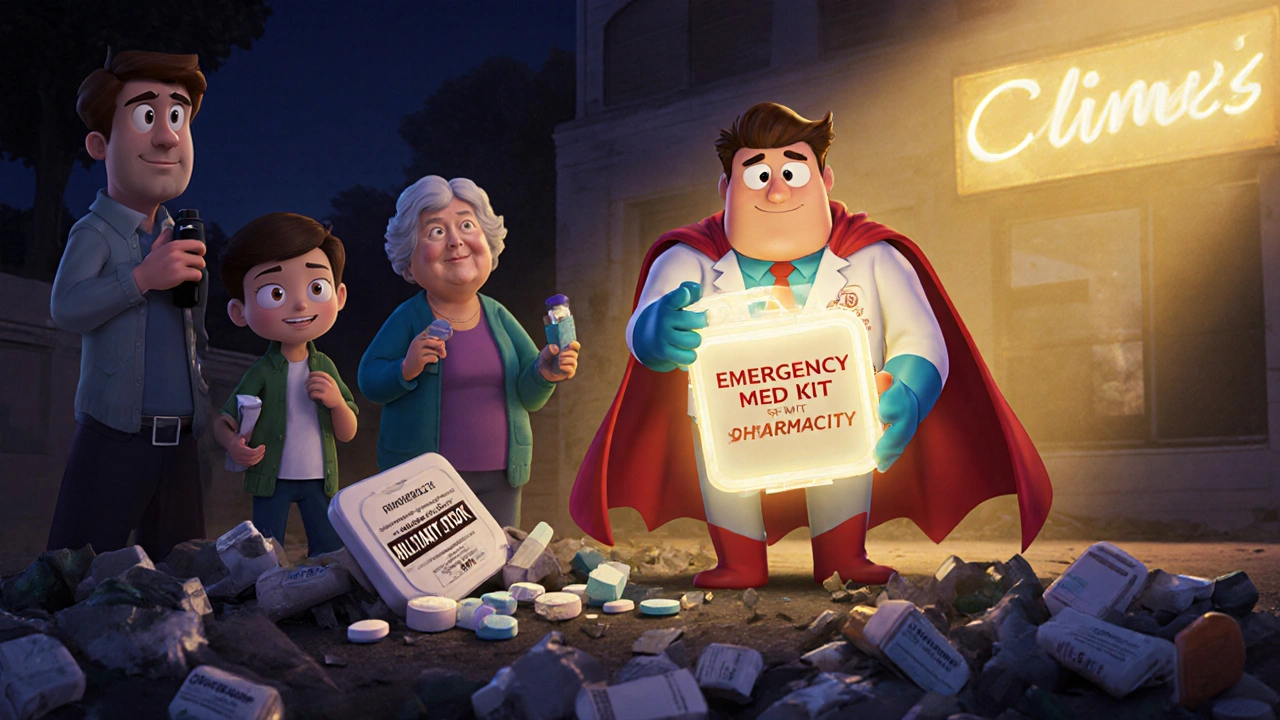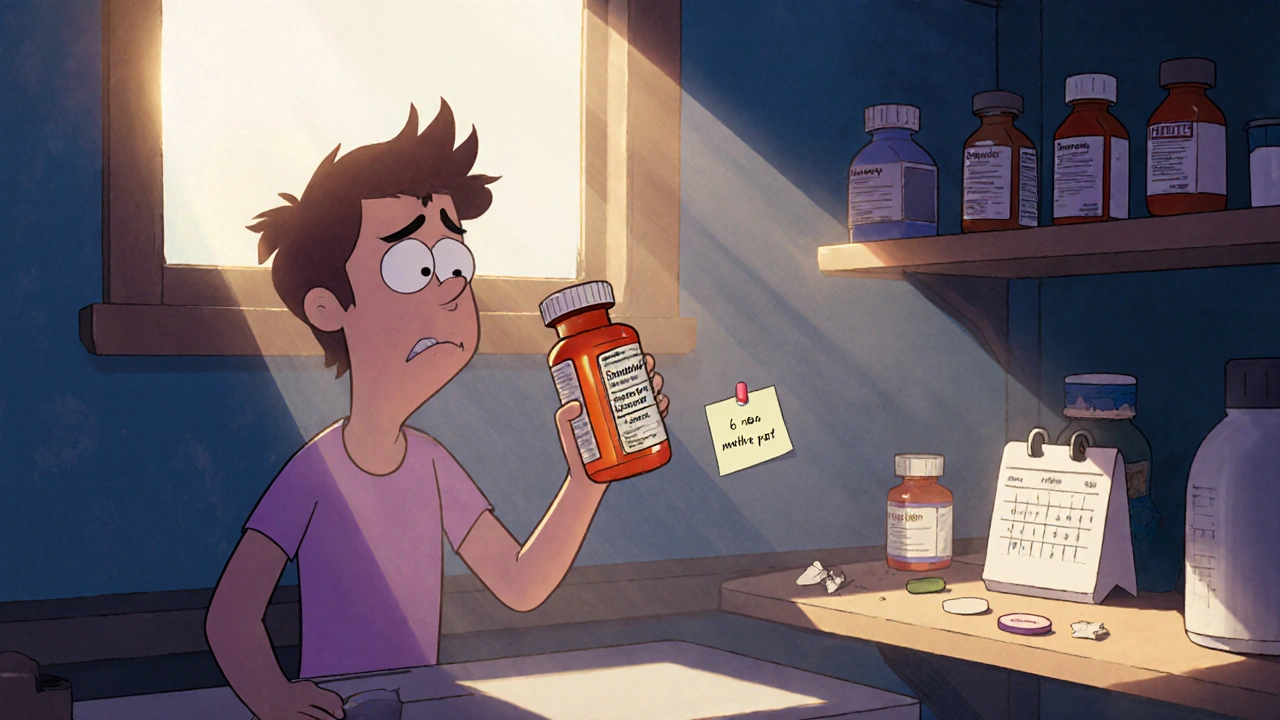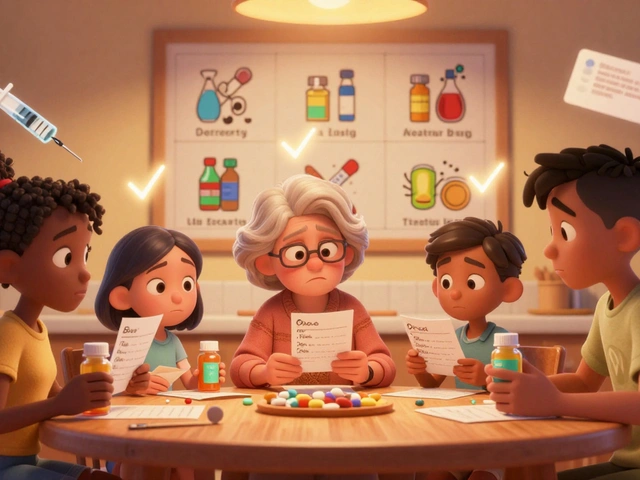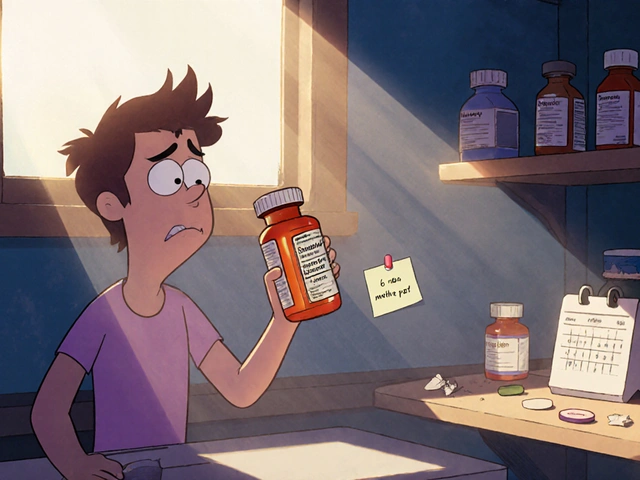What do you do when you need a pill - really need it - but the only one you have is past its expiration date? Maybe it’s a painkiller you’ve held onto for months, or an old inhaler tucked in the back of a drawer. You’re not alone. People in remote areas, during power outages, or after natural disasters often face this exact dilemma. The question isn’t whether expired meds are dangerous - it’s how dangerous they might be, and whether the risk is worth taking.
Expiration Dates Aren’t ‘Use-By’ Dates - But They’re Not Just Random
Expiration dates on medication packaging aren’t made up. They’re based on strict testing by manufacturers to guarantee the drug stays fully potent and safe until that date. In the U.S., this became law in 1979. But here’s the catch: that date doesn’t mean the medicine suddenly turns toxic or useless the next day. Many pills, especially solid tablets like ibuprofen or acetaminophen, can stay stable for years beyond their printed date - if stored right.
Studies by the U.S. Food and Drug Administration (FDA) show that about 90% of medications remain safe and effective up to 15 years past expiration, under ideal conditions. That’s a big number. But ideal conditions mean a cool, dry, dark place - not your bathroom cabinet, where steam from showers can ruin them. Most people don’t store meds that way. So while the FDA’s data gives a broad safety window, it doesn’t reflect real-life storage.
Not All Medications Are Created Equal
This is the most important rule: some drugs are never okay to use after they expire. If you’re considering using an expired medication, start by asking: What kind of drug is it?
- Never use expired: Insulin, thyroid medications (like levothyroxine), birth control pills, anti-platelet drugs (like aspirin or clopidogrel), and any injectables. These require precise dosing. A drop in potency can mean life or death - think blood sugar spikes from degraded insulin or blood clots from under-dosed anti-platelets.
- Use with extreme caution: Antibiotics. Even if they look fine, degraded antibiotics might not kill the infection. That doesn’t just mean you’ll feel worse - it can lead to antibiotic resistance, a growing global threat.
- Lower risk, but still questionable: Over-the-counter pain relievers (ibuprofen, acetaminophen), antihistamines (like Benadryl or Zyrtec), and some topical creams. These are less dangerous if they’ve lost a little strength. You might not get full relief, but you’re unlikely to be poisoned.
Washington State’s 2023 health report found that 68% of emergency visits involving expired meds were tied to insulin or heart medications. That’s not a coincidence. It’s a warning.
Formulation Matters More Than You Think
It’s not just the drug - it’s the form. A tablet? Usually fine. A liquid? Risky. A gel capsule? Watch out.
Solid tablets, especially if kept dry and cool, degrade slowly. They might lose some strength, but they rarely become harmful. Liquid medications - think cough syrup, eye drops, or insulin - are a different story. Once past their expiration date, they can grow bacteria or break down into toxic chemicals. The CDC warns explicitly: never use expired liquids.
Gel capsules are tricky. They’re sensitive to heat and humidity. If they’re sticky, melted, or discolored, toss them. Even if they’re only a month past expiry, the coating might have broken down, letting the medicine inside degrade faster.
How Long Is Too Long?
There’s no universal answer, but here’s a practical guide based on real-world data:
- 0-6 months past expiry: For stable OTC meds like painkillers or allergy pills - if stored well - it’s often low risk. Potency may be down 10-20%, but you’ll probably still get relief.
- 6-12 months: Proceed with caution. Check for changes in color, smell, or texture. Avoid for critical conditions.
- Over 12 months: Strongly discourage use, even for mild symptoms. Manufacturer data (like Tylenol’s 20% potency drop after 2-3 years) shows degradation accelerates over time.
Don’t guess. Count the months. If it’s been two years since your ibuprofen expired? Don’t take it for a migraine. If it’s been six months and you’re out of painkillers? It might be okay - but monitor how you feel.

Visual Inspection: Your Only Real Tool
When you’re stuck with expired meds and no alternatives, you have one tool: your eyes and nose.
Look for:
- Discoloration (yellow, brown, or patchy pills)
- Cracking, crumbling, or unusual stickiness
- Unusual odor - like vinegar or mold
- Particles or cloudiness in liquids
- Wet or warped packaging
If anything looks off, throw it out. No exceptions. Some degradation is invisible - you can’t tell if a pill has turned toxic just by looking. But if you see obvious signs of damage, the risk jumps dramatically.
Storage History: The Unknown Variable
You might not know how your meds were stored. Maybe they sat in a hot car. Maybe they were in a bathroom for five years. That matters.
Research from the PMC journal shows that medications stored in humid environments - like bathrooms - degrade 37% faster than those kept in a cool, dry drawer. Heat and light break down active ingredients. If you can’t prove your meds were stored well, assume they’re less stable.
European and U.S. drugs sometimes have different stability profiles due to different manufacturing standards. If your expired med was imported, you’re working with even less data.
When Is It Worth the Risk?
Not every situation is the same. Ask yourself:
- How serious is the condition? A headache? Maybe. A high fever with signs of infection? No.
- Is there any alternative? Even a pharmacy open 24 hours? A neighbor with extra meds? Call ahead.
- Who’s taking it? Children, elderly people, or those with weak immune systems are more vulnerable to under-dosed or contaminated meds.
Use expired meds only as a last resort - when you have no other option and the condition is mild. Never use them for life-threatening issues. If you’re unsure, wait. Call a pharmacist. Go to an urgent care center. The risk of doing nothing is often lower than the risk of using a degraded drug.

What About the Military’s 15-Year Meds?
You might have heard the U.S. Department of Defense extends the life of its stockpiled drugs for up to 15 years. That’s true. But here’s the catch: they test every batch in controlled labs. They store them in climate-controlled vaults. They don’t just rely on expiration dates - they test potency.
That program, running since 1986, tested over 3,000 medications. It’s not a model for your medicine cabinet. It’s a government logistics system. Don’t use it as justification to take your 10-year-old antibiotics.
Prevention Is Better Than Risk Assessment
Here’s the hard truth: 82% of emergency visits involving expired medications could have been avoided. How? By rotating your meds.
Check your medicine cabinet every six months. Toss anything expired. Don’t hoard. Buy only what you need. Keep a small emergency kit with current meds - not old ones. Store them in a cool, dry place - not the bathroom.
When you replace a prescription, ask your pharmacist: “Can I keep this for a while?” They’ll tell you if it’s stable and how long.
What’s Coming Next?
The FDA is researching portable devices that could let you test drug potency at home - like a breathalyzer for pills. But as of October 2023, none are available to the public. Until then, your best tools are knowledge, observation, and caution.
Expired meds aren’t always poison. But they’re never guaranteed. The safest choice is always a fresh, properly stored medication. If you’re forced to use an expired one, do it with eyes wide open - and never, ever take a risk with insulin, heart meds, or antibiotics.
Can expired painkillers like ibuprofen still work?
Yes, if they’re only a few months past expiry and stored properly. Studies show ibuprofen can retain effectiveness for up to a year after expiration, though potency may drop by 10-20%. Check for discoloration, crumbling, or odd smells. Avoid if expired over 12 months or stored in heat/humidity.
Is it safe to take expired antibiotics?
No. Expired antibiotics may not kill the infection, leading to treatment failure and worsening illness. Worse, they can contribute to antibiotic resistance - a major global health threat. Never use expired antibiotics, even for mild symptoms.
What should I do with expired medications?
Don’t flush them or throw them in the trash. Take them to a pharmacy drop-off location or a community drug disposal event. Many pharmacies offer free take-back programs. If none are available, mix pills with coffee grounds or cat litter in a sealed bag before discarding - this makes them unappealing to kids or pets.
Can I use expired insulin if it’s my only option?
Never. Insulin loses potency quickly after expiration and can cause dangerous blood sugar swings - including life-threatening hypoglycemia or hyperglycemia. If you’re out of insulin, seek emergency care immediately. There are no safe alternatives.
Do expiration dates vary by country?
Yes. The U.S., EU, and other regions have different testing standards and storage requirements. European drugs may have longer shelf lives under similar conditions, but you can’t assume this. Always treat any expiration date as the official cutoff unless confirmed by a licensed pharmacist.
Final Thought: When in Doubt, Don’t Take It
There’s no magic formula to make expired meds safe. You can’t test them at home. You can’t trust your gut. The safest answer is always: get a new one. If you’re in a crisis and have no choice, use the lowest possible dose of the least risky medication - and get help as soon as you can. Your health isn’t worth gambling on a pill that’s been sitting around for years.



I’ve had to use expired ibuprofen in rural India during monsoon season when pharmacies were flooded. The pills looked fine-no discoloration, no smell-and they worked, barely. But I didn’t take more than one, and I drank extra water. Not ideal, but survival isn’t about perfect conditions. Still, I toss anything over a year now. Better safe than sorry.
Let’s be clear: expiration dates are a corporate construct, yes-but they’re also a legal shield. The FDA’s 90% stability stat? That’s under controlled, climate-monitored, vacuum-sealed, lab-grade conditions. You? You stored that aspirin next to your hair dryer. So no, it’s not ‘probably fine.’ It’s a gamble with your liver, your kidneys, your immune system. And if you think you’re ‘just lucky,’ you’re not-you’re just not dead yet.
There’s something deeply human about holding onto pills like little talismans-reminders of past pain, past fear, past survival. We keep them because we’re afraid of being helpless again. But here’s the quiet truth: medicine isn’t magic. It’s chemistry. And chemistry doesn’t care about your nostalgia. The real courage isn’t taking the pill-it’s walking to the clinic, calling the pharmacist, asking for help-even when it’s inconvenient. You’re not weak for not using it. You’re wise.
So let me get this straight-you’re telling me a 3-year-old Tylenol is fine if it doesn’t look weird, but insulin from last Tuesday is a death sentence? Cool. Makes sense. Also, why are we still talking about this like it’s a philosophy seminar? Just go to CVS. They’re open 24/7. For $5. You’re welcome.
Let’s cut the fluff. The FDA study you cited? It tested drugs stored in military-grade vaults. Not your bathroom. Not your car glovebox. Not your grandma’s drawer in Florida. You’re cherry-picking data to justify a habit. And let’s not forget: 68% of ER visits from expired meds? That’s not ‘rare.’ That’s systemic negligence. If you’re using expired antibiotics because you ‘can’t afford’ a doctor-you’re not poor. You’re misinformed. And your laziness is making everyone else’s infections harder to treat.
USA made the best meds in the world. Other countries? They cut corners. If you got a drug from Europe or India and it's expired? Don't even think about it. Our FDA standards are the gold standard. If it's expired, it's trash. Period. No exceptions. And if you're in a disaster? Call 911. Don't be some DIY idiot. We have systems. Use them.
Been there. Done that. Took a 14-month-old Advil during a snowstorm when the nearest pharmacy was 40 miles away. Didn’t feel 100%, but the headache faded. No side effects. But here’s the thing-I didn’t take it for my kid. I didn’t take it for fever. Just a headache. And I threw the rest out the next day. 🙏 Always check color, texture, smell. If it looks like it’s been through a war? Don’t. And if you’re unsure? Call a pharmacist. They’re free. Seriously. They’ll answer. They want you to be safe.
if its just a little past date and looks fine, its prob fine. dont overthink it. your body knows what it needs. 🤷♂️
There is no such thing as ‘a little expired.’ Either it’s within the manufacturer’s validated stability window-or it’s a biohazard. The fact that people treat pharmaceuticals like leftover pizza is not just irresponsible-it’s a public health failure. You wouldn’t eat moldy bread. Don’t ingest moldy chemistry. And if you do, don’t come crying to the ER when your kidneys fail. You were warned. Twice.